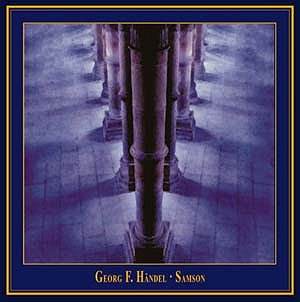Handel's oratorio Samson, composed in 1741, recounts
the betrayal, the remorse and the victory of Samson, the Israeli army
commander, whose power grew with his hair. The work begins one year
after he is captured and blinded, when the priests of the pagan god
Dagon are celebrating their greatest triumph. In his last struggle,
Samson, accompanied by his father Manoah and his friend Micah, has to
withstand the temptations of the seductress Dalila and the giant Harapha,
which are both followers of Dagon. When his strength returns, Samson
smashes the pillars of Dagonís temple and buries the enemies and himself
under the rubble.
With this biblical subject, Handel composed one of
his most beautiful oratorios. Featuring a wealth of memorable arias,
and some excellent choral movements, this work is one of his finest.
This recording, one of three Handel oratorios so far released by this
label, was recorded live over two performances at the Maulbronn Monastery
in Germany. One of the main attractions of this recording is the distinctive
sound of the monastery. The first few minutes of the work sound good,
but when the choir begins singing in the second section of the work,
the full beauty of this rich sound is heard. The choir, in fact, is
one of the high points of this recording. Its sound is outstanding,
partly because of the singing, and partly because of the natural resonance
of the venue.
The very first aria, Ye men of Gaza, sung by soprano
Sinéad Pratschke, is sung with great beauty and emotion. Her
voice is beautiful, and it marries perfectly with the monastery, giving
a truly magical effect. Her voice is heavenly and ethereal in the gentle
aria With plaintive notes..., a slow, moving song which recalls many
of the arias in Bach's sacred cantatas, where a soprano sings over an
obbligato violin weaving arabesques around the vocal melody, as her
voices resounds gently in the echo of the monastery.
Michael Chance is also memorable, and he shines in
the moving aria Then long eternity shall greet your bliss, a beautiful
piece that begins slowly, then moves into a second section with a much
more rapid melody, as Chance shows off his fine voice. He is nothing
short of magnificent in the long aria Return, o God of Hosts!, one of
Handel's most striking songs, with its slow, riverlike strophic melody,
which Chance's voice fits perfectly. This aria, at almost 14 minutes
long, is like a miniature opera on its own. After the first few verses
sung by the solo alto, to a pulsing string accompaniment, the choir
joins in for a second section, the alto sings another verse, and the
choir joins again, before a closing orchestral reprise of the verse
melody.
This work has many other fine arias, such as Just are
the ways of God to man, sung by baritone Raimund Nolte, and Honour and
arms scorn such a foe, sung by bass David Thomas. To make sure none
of the soloists are left out, Marc LeBrocq is an outstanding Samson.
This fine recording has the advantages and disadvantages
of all live recordings - while the tension and drama are evident, there
are a few moments when the sound is a bit muddy, with the orchestra
overpowering the soloists. Yet, on the whole, the sound in this monastery
is excellent. This is a beautiful recording of one of Handel's finest
oratorios, and is highly recommended.
Kirk McElhearn
CONTACT DETAILS
www.kuk-verlagsanstalt.com

![]() Maulbronner Kammerchor
Maulbronner Kammerchor
![]() K&K VERLAGSANSTALT
ISBN 3-930643-62-6 [154.31]
K&K VERLAGSANSTALT
ISBN 3-930643-62-6 [154.31]